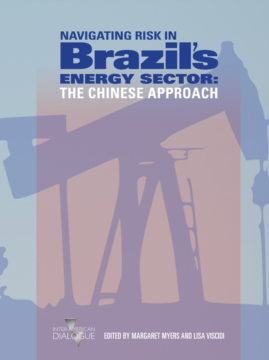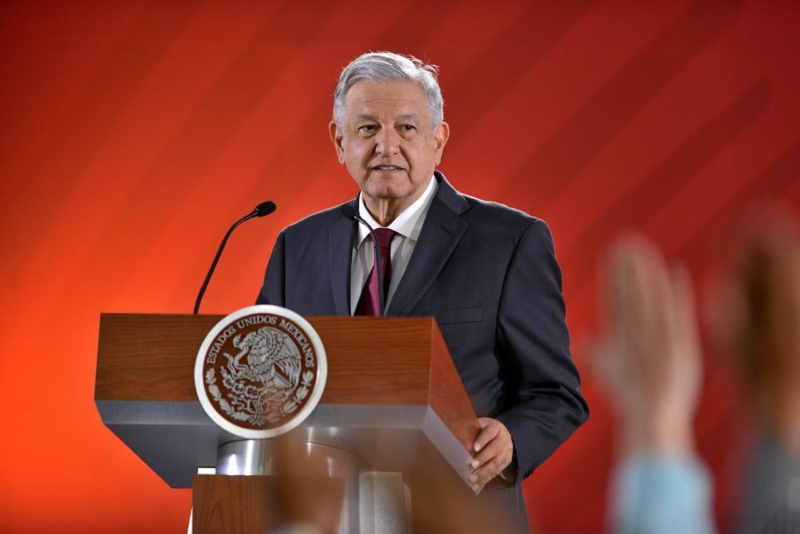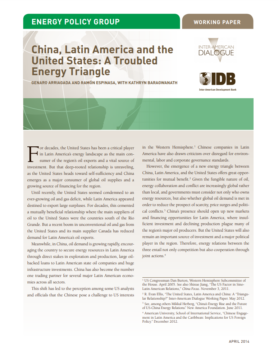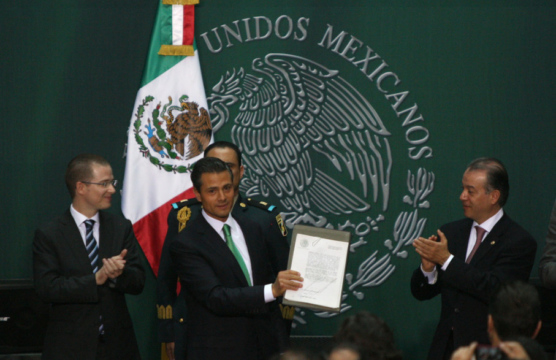
Navigating Risk in Brazil’s Energy Sector
Brazil’s oil and gas and electricity sectors are an important destination for Chinese direct investment.
A Publication of The Dialogue
The Mexican government on May 15 issued new rules for the operation of the country’s power grid, affecting dozens of renewable energy projects and drawing criticism for what energy companies and local industry groups say are measures that favor Mexican state-owned electric utility CFE over private developers. What do the new rules entail, and what is the government’s reasoning for implementing them? Why have the measures sparked controversy? To what extent will the decision affect foreign direct investment in Mexico’s power sector, and particularly ongoing and future renewable energy projects in the country?
Jeremy Martin, member of the Energy Advisor board and vice president for energy and sustainability at the Institute of the Americas: “The growing war on renewables in Mexico has taken center stage. It has moved to an all-out attack on renewable energy players and the role of clean energy for the nation’s energy matrix and economy. The charge of intermittency is but a stalking horse. In late October and again in April, AMLO’s government threw many of Mexico’s clean energy goals into doubt when it announced it was changing the market rules, first for clean energy certificates and more recently for renewable generators not yet online and to prioritize CFE. The latter was couched in the context of Covid-19, and using the euphemism of reliability, allowed CENACE to postpone renewable project pre-operation testing and essentially halt implementation of several projects; the effort directly favors CFE and the desire to increase Pemex-supplied fuel oil for power generation. There is, of course, great irony in the horrific damage to Mexico’s emission footprint at the time of a respiratory illness pandemic. The good news is that institutions are functioning and responding. Mexico’s judiciary and the independence of its legal system are providing a key avenue for reviewing the orders. The legal challenges being considered will have a strong role in the broader policy space. Anti-trust regulator COFEC issued a strong opinion indicating that CENACE’s measures would have an anticompetitive impact on the electric market. Furthermore, seven governors from across Mexico pushed back against the government’s renewable energy backsliding and erosion of its climate commitments. They assert the need to respect investment and investor confidence, with an eye to economic development and employment. But the challenge grows by the day, with every presidential morning press conference and interview by CFE director Manuel Bartlett. Investor confidence has been dashed. The message of opposition to private participation in the market has been sent and received loud and clear. Where we go from here is not clear.”
Víctor Rodríguez, professor at UNAM: “The May 15 rules seek to bring order to the incorporation of variable-generation power plants—wind and solar—into the electric grid. The opening, liberalization and deregulation of the electricity industry led to a boom in generation permits for variable energies without a prepared power grid. Authorities back then prioritized the entry of private investment, leaving the necessary public investments to improve and expand the transmission network for later. The power grid’s vulnerabilities emerged with the fall in demand amid Covid-19. At a low load, the system became unstable, and the network operator has had difficulties in maintaining reliable and quality supply. The risk of blackouts in some regions is real. As such, the government decided to moderate the entry of variable power plants to give the electric system time to adapt. There are also economic reasons. Policy and regulation so favorable to private capital, as well as the implicit subsidies in interconnection, support and porting during the Peña Nieto administration, seriously affected CFE’s finances. The government is now looking for private firms to pay full costs that come with presence on the electric grid. Mexico is highly polarized, and any official measure is used to disqualify the government, stir up squabbles and deepen divisions. The business sector and its political, media and academic environment have considered the electricity issue to be a measure against free enterprise, private initiative and competition. Their animosity against the president has led them to dismiss the power grid’s technical problems and the enormous damage it has caused the CFE.”
Dino Barajas, partner at DLA Piper: “The May 15 resolution was enacted to provide greater operational control to CFE over the country’s electrical grid. The government had been criticized for CENACE’s May 2 resolution, which prohibited testing and interconnection of intermittent power generation facilities (wind and solar) that weren’t already in commercial operation and allowed the government to prioritize fossil fuel facilities over intermittent facilities, irrespective of costs, under the guise of ensuring the electrical grid’s stability during the pandemic. The May 15 resolution sought to provide a legal basis for the prior resolution, which essentially amounted to a roll-back of years of energy reforms that had encouraged the development of cost-competitive green sources of electricity. The near-term effect will be chilling on renewable energy development. The unintended longer-term effect may be higher costs of development of the infrastructure sector for both the government and private parties, given that lenders and investors will scrutinize change in law risk and creeping expropriation if they lose faith in the stability of the legal regime. In an attempt to preserve investors’ rights and the value of their investments, our firm developed a legal response strategy for clients, consisting, in part, of filing of claims under NAFTA, other trade agreements and antitrust law. It will be critical for investors and lenders to be proactive in responding to these government policies in order to maintain placeholders for their legal rights in the event that the resolutions are not reversed. It would be more productive to investigate how renewable energy could assist with AMLO’s goals, such as rural electrification and promotion of social welfare programs. There are numerous ways for the government to augment its public budget and redirect it to social programs while leveraging private investment and maintaining control over the integrity and proper functioning of its public service utilities.”
Pedro Niembro, senior director, and Geoffrey Jones, senior vice president, both at Monarch Global Strategies: “The nationalistic energy goals of the administration are well known: avoiding fuel imports by increasing oil production and refining at Pemex and increasing the CFE’s share of power generation. Pursuit of the former, however, has created a headache for Pemex as Mexican oil is heavy and refining it yields significant quantities of high-sulfur fuel oil. Until this year, fuel oil could be sold to the shipping industry, but the IMO 2020 requirement for lower sulfur emissions in shipping has effectively eliminated this customer. Lost demand, combined with limited storage capacity, has resulted in excess fuel oil inventories. To solve this, CFE intends to generate more power from its fuel oil plants, but its capacity to do so is limited by a law that favors lower-priced renewable fuels. The new policy provides a way around this by favoring must-run facilities and returning certain responsibilities of the CRE and CENACE to CFE, which will again influence the electricity mix as it did before the energy reforms. The justification for this is that the intermittent availability of renewables adds stress to an already dilapidated transmission infrastructure as a result of decades of underinvestment in the grid by CFE in favor of generation projects. The financial impact of the new rules will be significant, with an estimated $6.5 billion in private sector projects already in development at risk and the potential loss of another $3 billion-$5 billion per year in renewable investments that will never get off the ground. In addition, tens of thousands of much-needed jobs and income to impoverished communities through land lease contracts could be lost.”
Héctor Castro, nonresident senior fellow at the Inter-American Dialogue: “The government’s argument responds to the low power consumption of end-users, due to Covid-19. It says the measures are required to ensure electricity supply, noting that the grid is flawed due to the intermittency of renewable energies. Among the actions CENACE mentioned, the suspension for pre-operational testing of wind and solar power plants in the process of commercial operation and the dispatch of ‘must-run’ power plants in some regions, without specifying the allocation criteria that it will apply, stands out. Mexico’s antitrust regulatory agency said the criteria for choosing the ‘must-run’ plants could result in discriminatory clearance and anticompetitive effects and could affect competition by not allowing solar and wind plants’ entry into the grid, regardless of efficiency. Twenty-eight solar and wind plants ready to begin operations will be affected, as well as 16 projects under construction. It could affect more than $6.4 billion of FDI and nearly 30,000 jobs. We should view this as part of energy policy over the past 18 months: a nationalistic approach to strengthening state productive enterprises and a campaign promise of not changing the legal framework, but with acts that raise concerns to the rule of law and that affect certainty for private investment.”
Jose L. Valera, member of the Energy Advisor board and partner at Mayer Brown: "The Energy Secretariat’s new rules are a sharp U-turn away from solar and wind renewable energy and toward more power generation with fossil fuels. The multiplicity of regulatory and economic burdens imposed by the decision on renewable energy projects, either currently in operation or planned, are calculated to keep them out of service as much as possible. The stated reason is that renewables affect the electric grid’s reliability. The real reason is that the AMLO administration does not want state-owned CFE’s fossil fuel plants playing a supporting and diminishing role in the face of growing market penetration by mostly privately-owned renewable generation. AMLO has said that maximizing the output of renewable energy before dispatching the CFE’s fuel oil, coal and gas plants to meet system demand is an undue preference that contributes to the plundering of Mexico’s patrimony. For AMLO, making a profit and looting are one and the same, especially with anything that has to do with energy. His administration is unwilling to make the co-investments necessary in infrastructure and ancillary services that are needed to support the emission of fewer greenhouse gases and to lower energy costs for the consumer. For AMLO, the CFE is an end in itself, not a means to provide cleaner air and lower energy costs. In a separate show of alarming contempt and disregard for the private sector’s capital investments, without any prior consultation, CENACE, the operator of the grid, on April 29 suddenly suspended (‘during the contingency caused by Covid-19’) pre-operating tests for solar plants and wind farms already built, thereby leaving them stranded. That measure was temporarily stayed by injunctions filed by the companies, but the final word is yet to be spoken."
Doris Rodriguez, partner at Hunton Andrews Kurth LLP in Houston, and Carlos Chavez, senior associate at JATA - J.A. Treviño Abogados: "These rules provide for a temporary suspension of pre-operation testing for solar and wind projects; a stronger CFE role in market operations; stricter requirements for generation permits; multiple interconnection roadblocks, including permitting discretion to CENACE in the approval process; ancillary services to ensure grid reliability and dispatch safety by providing backup capacity for intermittent clean energy generators and eliminating capacity credits to such generators. Importantly, an expected result is dispatch prioritization of CFE’s plants. The government based its justification on ensuring grid efficiency and reliability, citing electricity demand decrease due to Covid-19, congestion and the intermittent nature of certain clean energies. Aside from the perception of this being another chapter in the administration’s campaign against renewable energy, foreign investment and free-market rules, these measures have sparked outrage principally because due process and public consultation laws were not observed, as well as alleged violations of separation of powers principles and the supremacy clause. Additionally, these rules arguably contradict existing energy transition and climate change laws and open-access regulations, impose costs and requirements on certain renewable projects and present antitrust problems for CFE’s expanded role, as even the antitrust authorities have opined. If matters are not resolved by the Mexican courts or the antitrust agency or are not ultimately revoked by SENER or CENACE due to public and industry outcry or court losses, these measures will result in the market’s perceiving Mexico’s rule of law as deteriorating, which will negatively affect foreign direct investments in, and other economic support to, new and existing projects."
Carlos Ochoa, partner at Holland & Knight LLP: "The new rules impose additional scrutiny and supervision on the issuance of power generation permits for generation and supply companies and their operation in the grid. The Mexican government’s decision to implement these new rules is meant to preserve the grid’s reliability and safety, and further enforce its authority in the electricity sector. The new operating rules have created much controversy. On one side, the Mexican government argues that it is raising the bar for new projects to enter and operate in the grid to prevent noncompliant projects and an excess of capacity that could create excess charges or lower its cost. On the other side, private companies claim that such new rules are not sound and competitive policy principles. They argue that the rules will provide unfair advantages to the CFE, the state-owned utility and dominant market player, in all sectors, and create greater restrictions for new private power producers. This new policy will certainly create a major regulatory change that will affect projects currently in development or in financial negotiating stages, particularly for solar and wind power plants. Projects in the development phase will have to assess whether they are entitled to enter the power market under the law and under treaties, but future projects will, unfortunately, face a more expensive entry to this market. We expect to see projects competing for niche markets as the investment cost increases."
 The Latin America Advisor features Q&A from leaders in politics, economics, and finance every business day. It is available to members of the Dialogue’s Corporate Program and others by subscription.
The Latin America Advisor features Q&A from leaders in politics, economics, and finance every business day. It is available to members of the Dialogue’s Corporate Program and others by subscription.
Brazil’s oil and gas and electricity sectors are an important destination for Chinese direct investment.
The US’ standing as the main consumer of Latin America’s oil exports is unraveling as China emerges as a major consumer of global oil supplies.
The results of Mexico’s energy reforms may fall well short of government promises and public expectations.
 File Photo: Mexican Government.
File Photo: Mexican Government.

 Video
Video